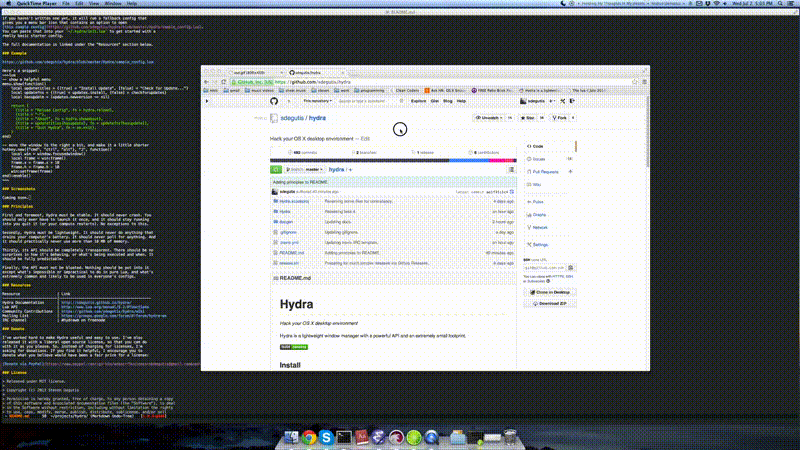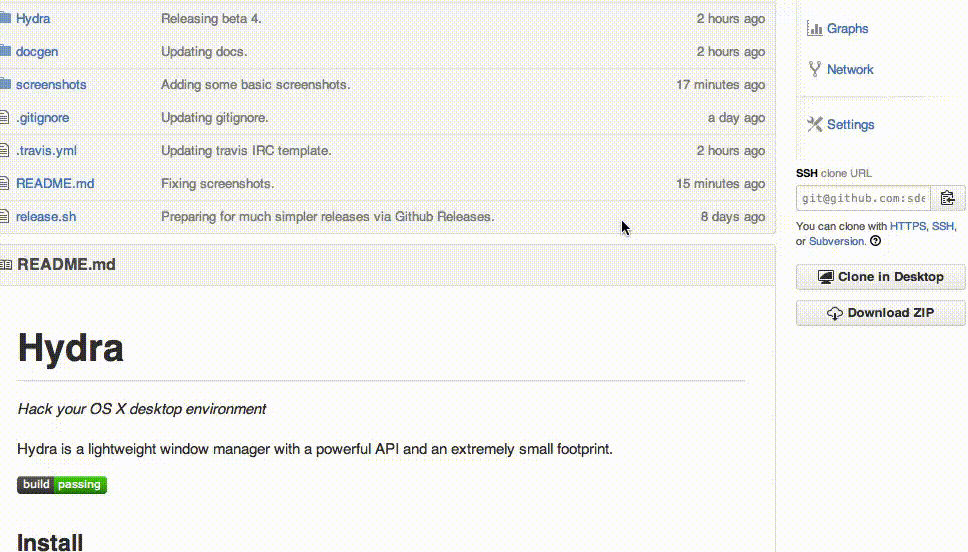Hack your OS X desktop environment
- Current version: 1.1
- Requires: OS X 10.8 and up
- Download: get latest release, unzip, right-click app, choose "Open"
Hydra will look for ~/.hydra/init.lua and run it if it exists. But
if you haven't written one yet, it will run a fallback config that
gives you a menu bar icon that contains an option to open the sample
initfile (shown below). You can save it to ~/.hydra/init.lua to get
started with a really basic starter config.
NOTE: Be sure to read the overview page of the documentation! It contains some very valuable information for getting started which isnt' found anywhere else in this project.
When you install and run Hydra, you'll see a menu that has an option to open the sample config, which you can then save as your own initfile and modify. But so you can get an idea of what it looks like, I've pasted the entire sample config here.
-- Hi!
-- Save this as ~/.hydra/init.lua and choose Reload Config from the menu (or press cmd-alt-ctrl R}
-- show an alert to let you know Hydra's running
hydra.alert("Hydra sample config loaded", 1.5)
-- open a repl with mash-R; requires https://github.com/sdegutis/hydra-cli
hotkey.bind({"cmd", "ctrl", "alt"}, "R", repl.open)
-- show a helpful menu
hydra.menu.show(function()
local t = {
{title = "Reload Config", fn = hydra.reload},
{title = "Open REPL", fn = repl.open},
{title = "-"},
{title = "About Hydra", fn = hydra.showabout},
{title = "Check for Updates...", fn = function() hydra.updates.check(nil, true) end},
{title = "Quit", fn = os.exit},
}
if not hydra.license.haslicense() then
table.insert(t, 1, {title = "Buy or Enter License...", fn = hydra.license.enter})
table.insert(t, 2, {title = "-"})
end
return t
end)
-- move the window to the right half of the screen
function movewindow_righthalf()
local win = window.focusedwindow()
local newframe = win:screen():frame_without_dock_or_menu()
newframe.w = newframe.w / 2
newframe.x = newframe.x + newframe.w -- comment out this line to push it to left half of screen
win:setframe(newframe)
end
-- bind your custom function to a convenient hotkey
-- note: it's good practice to keep hotkey-bindings separate from their functions, like we're doing here
hotkey.new({"cmd", "ctrl", "alt"}, "L", movewindow_righthalf):enable()
-- uncomment this line if you want Hydra to make sure it launches at login
-- hydra.autolaunch.set(true)
-- when the "update is available" notification is clicked, open the website
notify.register("showupdate", function() os.execute('open https://github.com/sdegutis/Hydra/releases') end)
-- check for updates every week, and also right now (when first launching)
timer.new(timer.weeks(1), hydra.updates.check):start()
hydra.updates.check()Install hydra-cli to access Hydra from the command line. Then you can do things like this:
$ hydra
Hydra interactive prompt.
> window.focusedwindow():title()
sdegutis — hydra — 100×30
> window.focusedwindow():application():title()
TerminalAt this interactive prompt, type help for instructions on using the
built-in documentation system.
NOTE: hydra-cli is guaranteed to be compatible with Hydra 1.x
(and will most likely remain compatible with all future versions of
Hydra). So you can upgrade hydra-cli mostly independently of the
Hydra version you're using.
Some brief examples of what you can do with Hydra:
| Description | Animated Screenshot |
|---|---|
| Using hotkeys to move and resize a window along a grid (using hydra-grid) |  |
Using a hotkey to open Dictionary.app and show an alert (using application.launchorfocus and hydra.alert) |
 |
| Exploring the built-in docs |  |
| Using hydra-cli to control Hydra from the command line |  |
-
Hydra must be stable. It should never crash. You should only ever have to launch it once, and it should stay running until you quit it. Period.
-
Hydra must be lightweight. It should never do anything that drains your computer's battery. It should never poll for anything. It should use as little RAM as possible. Everything it does should feel instant and snappy, never sluggish or delayed.
-
Hydra's API should be completely transparent. There should be no surprises in how it's behaving, or what's being executed and when. It should be fully predictable.
-
Hydra's API must not be bloated. Functionality should be included only if it can't be done in Lua or if it's extremely common and likely to be used by the vast majority of users.
| Resource | Link |
|---|---|
| Fancy Website | http://hackhydra.com/ |
| Github page | https://github.com/sdegutis/hydra/ |
| Hydra API | http://hackhydra.com/docs/ |
| Lua API | http://www.lua.org/manual/5.2/#functions |
| Third Party Extensions | https://github.com/sdegutis/hydra-ext |
| Community Resources | https://github.com/sdegutis/hydra/wiki |
| Bug Reports | https://github.com/sdegutis/hydra/issues |
| Feature Requests | https://github.com/sdegutis/hydra/issues |
| General Discussion | https://github.com/sdegutis/hydra/issues |
| IRC channel | #hackhydra on freenode |
Hydra is open source, released under the MIT license. But it's also commercial, requiring you to eventually purchase a license. However, the trial period is not timed, and doesn't remove any functionality.
-
I'm getting an error like this: attempt to index local 'win' (a nil value)
It almost definitely means you need to enable accessibility. This is especially true after upgrading to a new version of Hydra, since the accessibility checkbox for Hydra may be checked; just uncheck it and re-check it anyway, and then it should be fixed.
-
How does Hydra compare to Phoenix or Zephyros?
Hydra is the successor to Phoenix and Zephyros, my older projects which I don't update anymore. Hydra is simpler and more efficient (see the Principles section above).
-
How does Hydra compare to Slate?
They're both programmer-centric with mostly similar goals. Look over their APIs and see which one suits you better.
-
How does Hydra compare to Spectacle, Moom, SizeUp, Divvy, etc?
Hydra is intended for programmers who want to write programs that customize their environment. It's not intended to be a quick-and-easy solution, it's meant to allow you to write your own very personalized productivity enhancement suite to keep and use long-term.
-
Can you add ____ feature?
Maybe. File an issue and we'll find out!
-
Where can I find a comprehensive and detailed list of alternatives to Hydra?
-
Can I install Hydra via Cask?
Technically yes, but it will cause a lot of weird problems for you. Wait until Cask finishes their "upgrade" feature first, so that you can remove older copies of Hydra.app.
Hydra was created by Steven Degutis with the help of various contributors.
The icon/logo/statusitem was created by Jason Milkins (@jasonm23) with additional ideas and contributions from John Mercouris (@jmercouris). It's exclusively licenced to Steven Degutis and the Hydra.app project.
Released under MIT license.
Copyright (c) 2013 Steven Degutis
Permission is hereby granted, free of charge, to any person obtaining a copy of this software and associated documentation files (the "Software"), to deal in the Software without restriction, including without limitation the rights to use, copy, modify, merge, publish, distribute, sublicense, and/or sell copies of the Software, and to permit persons to whom the Software is furnished to do so, subject to the following conditions:
The above copyright notice and this permission notice shall be included in all copies or substantial portions of the Software.
THE SOFTWARE IS PROVIDED "AS IS", WITHOUT WARRANTY OF ANY KIND, EXPRESS OR IMPLIED, INCLUDING BUT NOT LIMITED TO THE WARRANTIES OF MERCHANTABILITY, FITNESS FOR A PARTICULAR PURPOSE AND NONINFRINGEMENT. IN NO EVENT SHALL THE AUTHORS OR COPYRIGHT HOLDERS BE LIABLE FOR ANY CLAIM, DAMAGES OR OTHER LIABILITY, WHETHER IN AN ACTION OF CONTRACT, TORT OR OTHERWISE, ARISING FROM, OUT OF OR IN CONNECTION WITH THE SOFTWARE OR THE USE OR OTHER DEALINGS IN THE SOFTWARE.